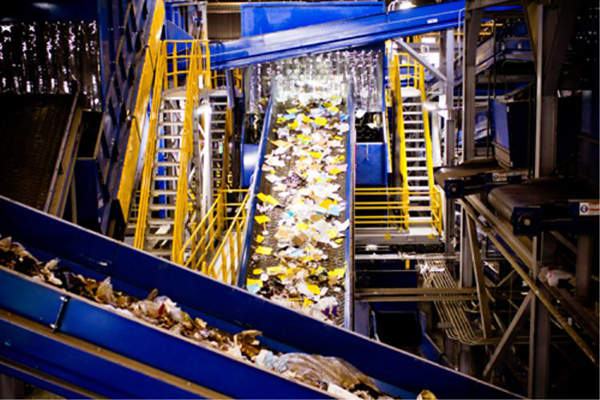In an era where environmental concerns are at the forefront of global discussions, the importance of responsible waste management cannot be overstated. Among the key players in the waste management industry is Republic Services, a leading provider of non-hazardous solid waste collection, transfer, disposal, and energy services. One of the company’s most notable initiatives in its quest for sustainability is the operation of material recovery facilities (MRFs). These facilities play a crucial role in recycling and reusing materials that would otherwise end up in landfills, contributing to pollution and waste management issues.

Introduction to Republic Services’ MRF
Republic Services’ material recovery facility is a state-of-the-art facility designed to efficiently sort and process recyclable materials from the waste stream. Equipped with advanced technologies, including optical scanners, air separators, and magnets, the facility can handle a wide range of materials, from paper and plastics to glass and metals. The process begins with the receipt of mixed recyclables from various sources, including residential curbside collection programs and commercial businesses.
Once the materials arrive at the facility, they undergo a series of sorting and cleaning processes. The first step involves removing large items such as cardboard and plastic bags, which can jam the sorting machinery. Next, the materials are sorted based on their composition and type, using a combination of manual and automated processes. For instance, magnets are used to extract ferrous metals, while eddy currents are employed to separate non-ferrous metals like aluminum.
The Sorting Process
The sorting process at Republic Services’ MRF is a complex and carefully calibrated operation. The facility uses a range of technologies, including optical scanners, to identify and separate different types of materials. These scanners use infrared light to detect the chemical composition of materials, allowing for accurate identification and sorting. Additionally, the facility employs air separators, which use air jets to blow lighter materials, such as paper and plastic, away from heavier materials like glass and metal.
The sorted materials are then baled and prepared for shipping to manufacturers, who use them to produce new products. For example, recycled paper is used to make new paper products, such as cardboard, newspaper, and packaging materials. Similarly, recycled plastics are used to manufacture a range of products, from plastic bottles and containers to outdoor furniture and playground equipment.
Benefits of the MRF
The Republic Services material recovery facility offers a range of benefits, both environmental and economic. By recycling and reusing materials, the facility helps to conserve natural resources, reduce greenhouse gas emissions, and decrease the amount of waste sent to landfills. According to the Environmental Protection Agency (EPA), recycling helps to conserve 117 million metric tons of carbon equivalent, equivalent to taking 23 million cars off the road.
In addition to its environmental benefits, the MRF also generates significant economic benefits. The facility creates jobs, both directly and indirectly, and stimulates economic activity through the purchase of recycled materials. Furthermore, the facility helps to reduce the costs associated with waste disposal, as recycling is often more cost-effective than landfilling.
Challenges and Opportunities
Despite the many benefits of the MRF, there are also challenges and opportunities for improvement. One of the main challenges facing the facility is contamination, which occurs when non-recyclable materials are placed in recycling bins. Contamination can lead to significant problems, including equipment damage and decreased efficiency. To address this issue, Republic Services has implemented education and outreach programs, aimed at informing residents and businesses about the importance of proper recycling practices.
Another challenge facing the facility is the fluctuating market for recycled materials. Changes in global demand and supply can lead to significant fluctuations in the price of recyclables, making it challenging for the facility to operate profitably. To mitigate this risk, Republic Services has diversified its operations, investing in new technologies and markets for recycled materials.
FAQ
- What types of materials can be recycled at the MRF?
The facility accepts a wide range of materials, including paper, plastic, glass, and metal. - How does the sorting process work?
The sorting process involves a combination of manual and automated processes, using technologies such as optical scanners, air separators, and magnets. - What happens to the sorted materials?
The sorted materials are baled and prepared for shipping to manufacturers, who use them to produce new products. - How does the MRF benefit the environment?
The facility helps to conserve natural resources, reduce greenhouse gas emissions, and decrease the amount of waste sent to landfills. - What are some of the challenges facing the MRF?
The facility faces challenges such as contamination, fluctuating market prices for recyclables, and equipment maintenance.
Conclusion
The Republic Services material recovery facility is a shining example of sustainability in action. By recycling and reusing materials, the facility helps to conserve natural resources, reduce greenhouse gas emissions, and decrease the amount of waste sent to landfills. While there are challenges and opportunities for improvement, the facility remains a crucial component of the waste management infrastructure, playing a vital role in protecting the environment and promoting economic development. As the world continues to grapple with the challenges of waste management, the Republic Services MRF serves as a model for innovation and sustainability, demonstrating the potential for waste management to be a positive force for environmental protection and economic growth.
Closure
Thus, we hope this article has provided valuable insights into Republic Services Material Recovery Facility: A Beacon of Sustainability. We appreciate your attention to our article. See you in our next article!